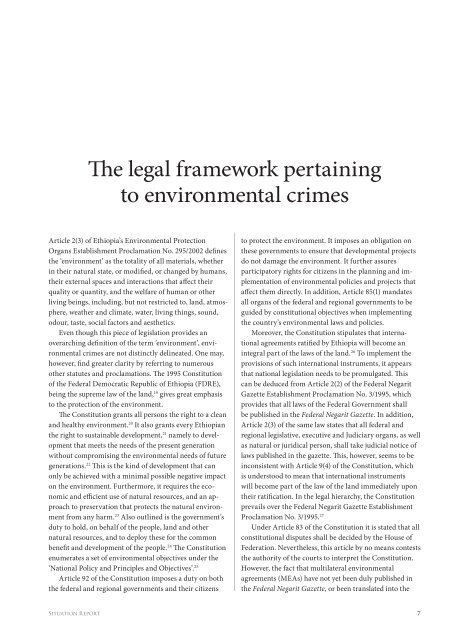4466 Environmental Crimes in Ethiopia.indd
4466 Environmental Crimes in Ethiopia.indd
4466 Environmental Crimes in Ethiopia.indd
Create successful ePaper yourself
Turn your PDF publications into a flip-book with our unique Google optimized e-Paper software.
The legal framework perta<strong>in</strong><strong>in</strong>g<br />
to environmental crimes<br />
Article 2(3) of <strong>Ethiopia</strong>’s <strong>Environmental</strong> Protection<br />
Organs Establishment Proclamation No. 295/2002 def<strong>in</strong>es<br />
the ‘environment’ as the totality of all materials, whether<br />
<strong>in</strong> their natural state, or modified, or changed by humans,<br />
their external spaces and <strong>in</strong>teractions that affect their<br />
quality or quantity, and the welfare of human or other<br />
liv<strong>in</strong>g be<strong>in</strong>gs, <strong>in</strong>clud<strong>in</strong>g, but not restricted to, land, atmosphere,<br />
weather and climate, water, liv<strong>in</strong>g th<strong>in</strong>gs, sound,<br />
odour, taste, social factors and aesthetics.<br />
Even though this piece of legislation provides an<br />
overarch<strong>in</strong>g def<strong>in</strong>ition of the term ’environment’, environmental<br />
crimes are not dist<strong>in</strong>ctly del<strong>in</strong>eated. One may,<br />
however, f<strong>in</strong>d greater clarity by referr<strong>in</strong>g to numerous<br />
other statutes and proclamations. The 1995 Constitution<br />
of the Federal Democratic Republic of <strong>Ethiopia</strong> (FDRE),<br />
be<strong>in</strong>g the supreme law of the land, 19 gives great emphasis<br />
to the protection of the environment.<br />
The Constitution grants all persons the right to a clean<br />
and healthy environment. 20 It also grants every <strong>Ethiopia</strong>n<br />
the right to susta<strong>in</strong>able development, 21 namely to development<br />
that meets the needs of the present generation<br />
without compromis<strong>in</strong>g the environmental needs of future<br />
generations. 22 This is the k<strong>in</strong>d of development that can<br />
only be achieved with a m<strong>in</strong>imal possible negative impact<br />
on the environment. Furthermore, it requires the economic<br />
and efficient use of natural resources, and an approach<br />
to preservation that protects the natural environment<br />
from any harm. 23 Also outl<strong>in</strong>ed is the government’s<br />
duty to hold, on behalf of the people, land and other<br />
natural resources, and to deploy these for the common<br />
benefit and development of the people. 24 The Constitution<br />
enumerates a set of environmental objectives under the<br />
‘National Policy and Pr<strong>in</strong>ciples and Objectives’. 25<br />
Article 92 of the Constitution imposes a duty on both<br />
the federal and regional governments and their citizens<br />
to protect the environment. It imposes an obligation on<br />
these governments to ensure that developmental projects<br />
do not damage the environment. It further assures<br />
participatory rights for citizens <strong>in</strong> the plann<strong>in</strong>g and implementation<br />
of environmental policies and projects that<br />
affect them directly. In addition, Article 85(1) mandates<br />
all organs of the federal and regional governments to be<br />
guided by constitutional objectives when implement<strong>in</strong>g<br />
the country’s environmental laws and policies.<br />
Moreover, the Constitution stipulates that <strong>in</strong>ternational<br />
agreements ratified by <strong>Ethiopia</strong> will become an<br />
<strong>in</strong>tegral part of the laws of the land. 26 To implement the<br />
provisions of such <strong>in</strong>ternational <strong>in</strong>struments, it appears<br />
that national legislation needs to be promulgated. This<br />
can be deduced from Article 2(2) of the Federal Negarit<br />
Gazette Establishment Proclamation No. 3/1995, which<br />
provides that all laws of the Federal Government shall<br />
be published <strong>in</strong> the Federal Negarit Gazette. In addition,<br />
Article 2(3) of the same law states that all federal and<br />
regional legislative, executive and Judiciary organs, as well<br />
as natural or juridical person, shall take judicial notice of<br />
laws published <strong>in</strong> the gazette. This, however, seems to be<br />
<strong>in</strong>consistent with Article 9(4) of the Constitution, which<br />
is understood to mean that <strong>in</strong>ternational <strong>in</strong>struments<br />
will become part of the law of the land immediately upon<br />
their ratification. In the legal hierarchy, the Constitution<br />
prevails over the Federal Negarit Gazette Establishment<br />
Proclamation No. 3/1995. 27<br />
Under Article 83 of the Constitution it is stated that all<br />
constitutional disputes shall be decided by the House of<br />
Federation. Nevertheless, this article by no means contests<br />
the authority of the courts to <strong>in</strong>terpret the Constitution.<br />
However, the fact that multilateral environmental<br />
agreements (MEAs) have not yet been duly published <strong>in</strong><br />
the Federal Negarit Gazette, or been translated <strong>in</strong>to the<br />
Situation Report 7
















